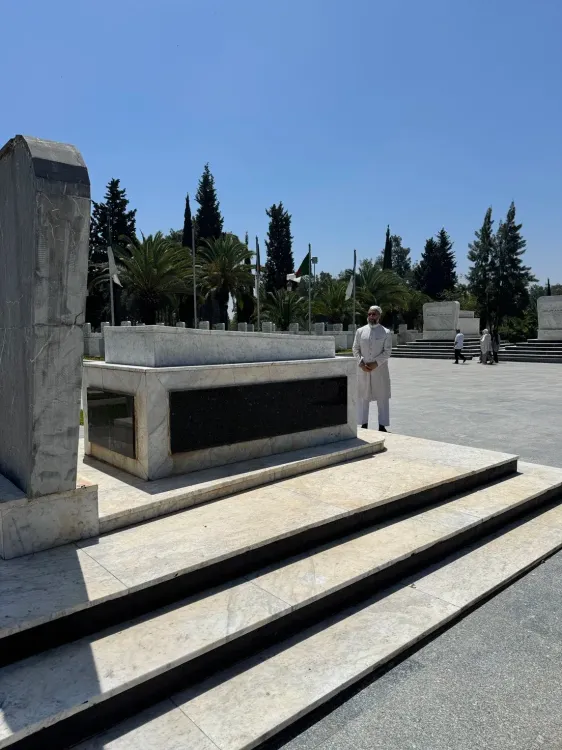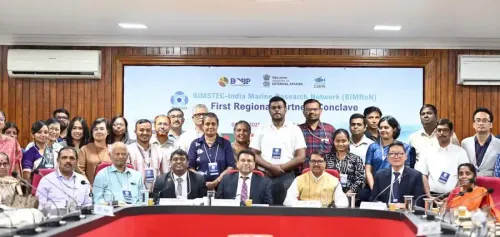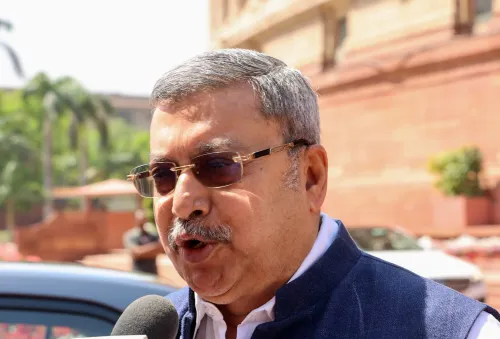Did AIMIM Chief Owaisi Honor Algerian Freedom Fighter Amir Abdul Qadir?

Synopsis
Key Takeaways
- Owaisi's tribute highlights the importance of historical leaders in the fight against oppression.
- Amir Abdul Qadir's legacy unites Algeria's diverse tribes against colonialism.
- The delegation's visit underscores the need for global cooperation against terrorism.
- Understanding historical resistance movements can inform current strategies against extremism.
- International solidarity remains crucial in the fight against injustice.
Algiers, June 2 (NationPress) The Chief of the All India Majlis-e-Ittehadul Muslimeen (AIMIM), Asaduddin Owaisi, paid his respects at the grave of the courageous military leader Amir Abdul Qadir, a pivotal figure in Algeria's struggle against the French colonial forces in the early 19th century.
As part of an all-party Parliamentary delegation, which included BJP MP Baijayant Jay Panda, Owaisi shared his thoughts on his official X account, stating: "At the Muqam (grave) of Amir Abdul Qadir Al Hasani Al Jazairi, rta in Algiers. Amir was a leader of the Algerian Revolution against the brutal French invaders. An extraordinary individual, a military leader with a strong moral compass, Islamic scholar (Aalim), poet, and Qadiri Sheikh who authored 'Al Mawaqif'."
Earlier that day, Owaisi expressed on X: "Amir Abdul Qadir was a military commander who opposed the French invasion, united the tribes of Algeria, and was a captivating speaker. Abraham Lincoln even sent him revolvers as a gift... A saint among princes, the prince among saints... A hero for Algerians and all those who stand against oppression and injustice."
After their fruitful engagements in Bahrain, Kuwait, and Saudi Arabia, the delegation arrived in Algeria on Friday and will continue meetings until June 2 to seek international backing against cross-border terrorism originating from Pakistan.
This delegation, headed by BJP MP Baijayant Jay Panda, includes BJP MPs - Nishikant Dubey, Phangnon Konyak, and Rekha Sharma, AIMIM MP Asaduddin Owaisi, BJP MP Satnam Singh Sandhu, and former Indian diplomat Harsh Vardhan Shringla.
The outreach comes in the wake of the devastating April 22 Pahalgam terror attack, Operation Sindoor, and subsequent developments aimed at fostering global cooperation to combat terrorism.
Emir Abdelkader, also known as Abd al-Qadir al-Hassani al-Jaza'iri, was an Islamic scholar and Sufi leader who unexpectedly took command of a military campaign, uniting Algerian tribesmen to effectively resist one of Europe's most advanced armies for years.
His unwavering respect for what would now be termed human rights, particularly regarding his Christian adversaries, earned him widespread acclaim. His crucial intervention to protect the Christian community of Damascus from massacre in 1860 garnered honors and accolades worldwide.
Within Algeria, he succeeded in uniting various Arab and Berber tribes against the encroaching French colonization.
His endeavors to rally the nation against the French invaders prompted some French authors to regard him as a "modern Jugurtha" (Jugurtha was a king of Numidia, an ancient kingdom in northwest Africa). His unique ability to merge religious and political authority has led to him being celebrated as the 'Saint among Princes, the Prince among Saints.'
The French invasion of Algeria began in 1830, supplanting the Ottoman Empire's control and leading to a period of colonial domination. Western Algeria had already experienced numerous anti-Ottoman uprisings, resulting in a lack of coordinated resistance to the French.
When the French Army reached Oran in January 1831, Abdelkader's father was called to spearhead a resistance campaign; Muhieddine urged jihad, and both father and son participated in early assaults on the city's walls, although these did not galvanize a broad coalition of tribes.
It was at this juncture that Abdelkader emerged as a leader. During a meeting of the western tribes in the autumn of 1832, he was elected as Amir al-Mu'minin (commonly abbreviated to "Emir"). His father's rejection of the role due to age opened the door for Abdelkader, who was deemed suitable not only for his youth but also for his education, devotion, and noble lineage. Five days later, his appointment was affirmed at the Great Mosque of Mascara, where a proclamation was delivered, calling tribal leaders to unite under his banner in deeply religious terms.









